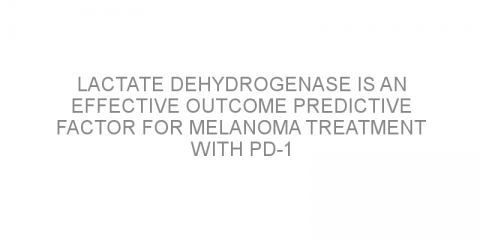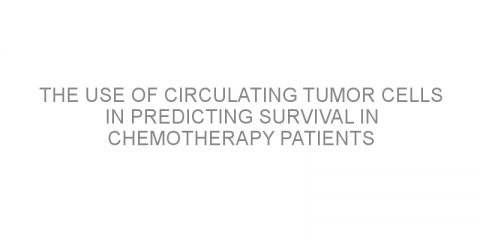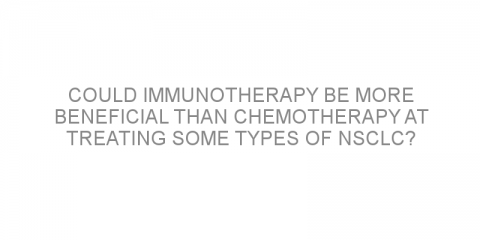In a nutshell This study reviewed the updated NCCN guidelines for the treatment of metastatic (spread to other parts of the body) melanoma. Some background New treatments have been developed in recent years for metastatic melanoma, particularly targeted and immunotherapies. These treatments are leading to improved response and survival in these...
Read MoreCurrent stage -Stage IV Posts on Medivizor
Lactate dehydrogenase is an effective outcome predictive factor for melanoma treatment with PD-1 agents
In a nutshell This study investigated whether changes in lactate dehydrogenase (LDH) levels in the blood could predict treatment response to PD-1 agents. Researchers suggested that LDH could be a useful factor to predict treatment outcomes in patients with advanced melanoma. Some background The use of PD-1 agents to treat melanoma is...
Read MoreThe use of circulating tumor cells in predicting survival in chemotherapy patients
In a nutshell The aim of this study was to investigate if circulating tumor cells (CTC) levels in the blood could be used to determine the outcome for metastatic castration resistant prostate cancer patients. This study concluded that CTC levels could be used to predict survival in these patients. Some background Treatment for metastatic...
Read MoreHow does hormone receptor status affect patient response to trastuzumab therapy in metastatic breast cancer
In a nutshell This study investigated the clinical factors that influence patient response to trastuzumab (Herceptin) therapy in human epidermal growth factor receptor 2 positive (HER2+) metastatic breast cancer (MBC). Hormone receptor (HR) status was found to be a possible predictor of a strong response to trastuzumab-based therapy. Some background...
Read MoreTreatments available for advanced, hormone-resistant prostate cancer
In a nutshell The authors aimed to determine guidelines for the treatment of relapsing, metastatic, and hormone-resistant prostate cancer. Some background Metastatic prostate cancer (advanced cancer) is cancer that has spread outside of the prostate to other organs of the body, despite treatment. Hormone therapy is the standard...
Read MoreReduced risks for advanced prostate cancer patients who choose intermittent androgen deprivation therapy
In a nutshell This study examined if intermittent androgen deprivation therapy (IADT) reduced the risks associated with continuous androgen deprivation therapy (CADT) in advanced prostate cancer patients. It was concluded IADT reduced the risk of heart failure and fractures. Some background Advanced prostate cancer is cancer that has spread...
Read MoreUsing aggressive treatment after first line treatment for advanced non-small-cell lung cancer
In a nutshell The authors examined the use of local consolidative therapy to treat patients with advanced NSCLC with few metastases after first line treatment. They concluded that this is more effective than maintenance therapy alone for this specific group of patients. Some background Previous studies that examined treatment failure after first...
Read MoreLooking for advanced melanoma patients to test effectiveness and safety of the combined treatment Dabrafenib and Trametinib
In a nutshell This trial aims to test the safety and effectiveness of combined treatment with dabrafenib (Tafinlar) and trametinib (Mekinist) in patients with inoperable advanced BRAF mutated melanoma. The main outcome to be measured will be the time to disease progression, response rates, and the number of negative side effects. The...
Read MoreGuidelines for treating advanced non-small-cell lung cancer
In a nutshell The review summarizes recent clinical trials and provides up to date guidelines on the detection, treatment and follw-up of advanced non-small-cell lung cancer (NSCLC). Some background Lung cancer is the leading cause of cancer-related deaths globally with NSCLC as the most common subtype of lung cancer. The success...
Read MoreBevacizumab with chemotherapy as a third-line treatment for recurrent/metastatic breast cancer
In a nutshell This study investigated the long-term effectiveness bevacizumab (Avastin) with chemotherapy for HER2-negative locally recurrent/metastatic breast cancer. This study concluded that while bevacizumab combined with chemotherapy significantly improved time to disease progression compared with chemotherapy alone in the first two phases...
Read MoreCould immunotherapy be more beneficial than chemotherapy at treating some types of NSCLC?
In a nutshell This trial determined whether pembrolizumab (Keytruda) is more effective at treating advanced NSCLC than chemotherapy in patients with high levels of a specific protein called PD-L1. The authors concluded that, for this subgroup of patients, pembrolizumab was more effective and safer than chemotherapy. Some background In some...
Read MoreEffective and safe neoadjuvant therapy to treat locally advanced rectal cancer
In a nutshell This study investigated the effectiveness and safety of pre-surgery combined chemotherapy with 5-fluorouracil and oxaliplatin (5-FU/OX) and radiotherapy in locally advanced rectal cancer (LARC). Researchers suggested that this combined treatment could be beneficial for LARC patients. Some background The standard treatment for...
Read More













